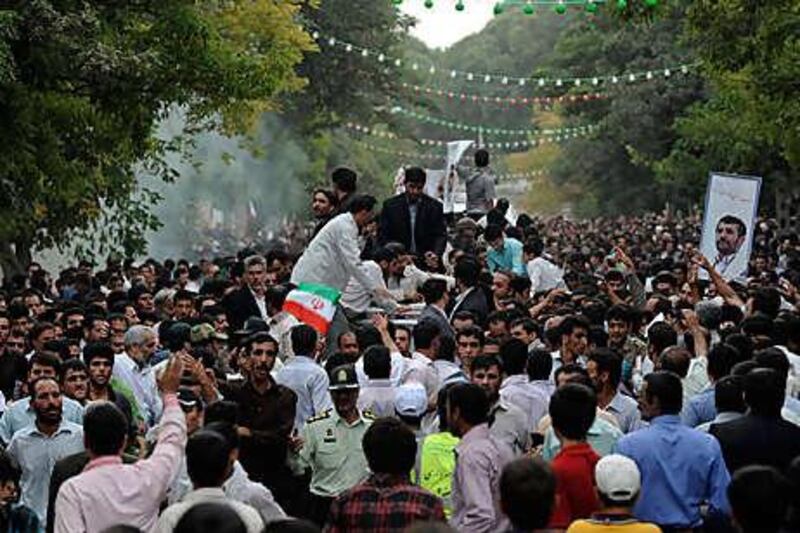Was it a welcoming firecracker or a hostile hand grenade? Whatever went off yesterday at Mahmoud Ahmadinejad's motorcade in the south-western city of Hamedan, 400km south-west of Tehran, the conflicting reports from Tehran agreed that it made a lot of noise and smoke and exploded at least 100 metres from his car. And that the Iranian president was unscathed.
If it was an attack aimed at Mr Ahmadinejad - and there was no confirmation or claim of responsibility - it appeared to be opportunistic and highly unprofessional. State-run media, however, insisted the blast was caused by a firecracker and reported that the local who had thrown it was in detention last night. The first domestic report of the incident came from a conservative Iranian website that said that a hand grenade had exploded next to a vehicle carrying reporters, 100 metres from the president's car.
The alleged attacker was detained, said Khabaronline.ir, which is close to Ali Larijani, Iran's parliamentary speaker, a conservative rival of the president. A source in the president's office gave Reuters a similar account, saying the president's convoy was targeted as he was travelling from Hamedan airport to give a speech at a sport arena. Mr Ahmadinejad was unhurt but others had been injured in the blast. One person was arrested, the source said.
A new official line soon emerged, however, vehemently denying there had been an attack on the president's motorcade: the blast was caused by a firework set off by locals delighted by the president's visit to Hamedan. Iran's state-run English language channel, Press TV, blamed "foreign news sources" for circulating "false" reports of a grenade attack. Khabaronline, meanwhile, dropped "grenade" in its later reports, using the word "firecracker" instead. Other Iranian news agencies followed suit.
Linguistics may have played a part in the confusion. Festive firecrackers that make a lot of noise and smoke are called najarek in Farsi, the same word for hand grenades. A senior independent analyst in Tehran, who declined to be named, said in an interview: "I don't think the state-media are covering up. It was only a firecracker." Mr Ahmadinejad was shown on live Iranian television giving his scheduled speech in the Hamedan sports stadium, where he appeared unperturbed and made no mention of the alleged attack.
The Iranian president, whose popularity at home is waning amid a faltering economy and tightened UN and western sanctions over Tehran's nuclear programme, regularly tours his country to deliver provocative speeches before adoring crowds who chant "death" to Iran's enemies. The populist but divisive president has made many enemies in conservative and reformist circles, as well as abroad. Iran was convulsed by its worst unrest since the 1979 Islamic revolution after Mr Ahmadinejad's re-election last year, which his critics insist was fraudulent. But the opposition green movement is pledged to nonviolent ways of challenging his "illegitimate" government. And the regime made no attempt to blame any of its domestic opponents for yesterday's drama.
During a speech to a conference of expatriate Iranians in Tehran on Monday, Mr Ahmadinejad, however, said he believed Israel was plotting to kill him. "The stupid Zionists have hired mercenaries to assassinate me," he said. Mr Ahmadinejad has made several claims in the past of assassination plots against him, some of which were derided by Iranian commentators for their outlandish nature. Two years ago, Mr Ahmadinejad claimed there was a plot to kidnap and kill him during a trip to Iraq - the first ever by an Iranian president - but the plan was foiled after the Iranian delegation changed their travel plans.
Later in 2008, there was an attempt to zap him with poisonous X-rays at his hotel while he was in Italy for the UN World Food Summit, Iran's then ambassador to Rome, Abolfazi Zohrevand, claimed. Both plots were "in line with the order given by [US president George W Bush] to kill Iranian leaders," Ali Zabihi, a senior presidential aide, alleged at the time. Iranian intelligence officials have also claimed that Mr Ahmadinejad has been targeted for assassination by the outlawed Mujahideen Khalq (MKO), which carried out several anti-government attacks after the 1979 Islamic revolution. It was blamed for two notorious 1981 bombings that killed dozens of senior officials in Tehran.
But an MKO spokesman strongly denied any involvement in yesterday's incident. Experts also doubt the group would have the ability for such an operation - or the motive, as it is trying to persuade the US and EU to remove it from their lists of terrorist organisations. Several armed groups opposed to the government are active in Iran, mostly fighting in the name of ethnic Kurds in the north-west, Baloch in the south-east and Arabs in the south-west.
Jundallah, a banned Sunni Baloch extremist group, was blamed for an attack on Mr Ahmadinejad's motorcade in Sistan-Balochistan in December 2005. But he had already left the province before the assault, which reportedly killed one of his bodyguards. Yesterday's incident in Hamedan, occurred a long way away from Jundallah's area of operations, which are in the remote and turbulent Baloch areas bordering Pakistan.
Hamedan, by contrast, is a stable area without any notable ethnic or local tension although it is close to the Kurdish area of Iran, which has witnessed occasional clashes between Kurdish rebels and security forces in recent years. But Iran's Kurds have no record of assassination attempts. mtheodoulou@thenational.ae





